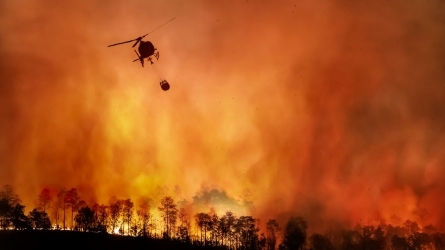
Forest fires, how to tackle them?
Forests all over Europe are burning in summer ... and beyond. These forest fires are not only increasing in number, they are also becoming more virulent and destructive. We urgently need to tackle and control them. Let's see how we do it.
Description
Fire has historically been a well-known element for human beings. It has accompanied us, and we have encouraged it, in order to make the necessary use of it and to develop endless benefits for our societies. It is not something specific and local, but something that has extended throughout our history, throughout the world and throughout all human societies.
In the same way, the wildfires that fire can produce have been common in natural terrestrial ecosystems. Everything made up of plants can be in a position to burn, especially in forest ecosystems, as they contain a high concentration of fuel material. Therefore, the landscape that surrounds us, regardless of the plant formation it is made up of, but especially if it is made up of forests, can become the pasture of flames, which makes forest fires a determining element in the conformation and development of both the landscape and natural systems.
But the effect of fire, and the effect of wildfires, goes beyond mere landscape or ecosystem composition. They can seriously affect our infrastructures, our buildings, our recreational areas, our sources of supply... the life and development of our societies can be truncated and aggravated by this element and these events. Fire, and wildfires, can both condition our development and tragically disrupt it.
The trend of recent years does not look good. The world in general, and southern Europe in particular, suffers every year from devastating forest fires that are becoming increasingly virulent and less and less controllable. In the past year alone, fires in south-western Europe have quadrupled the average annual area burned. Moreover, the virulence of the fires was extreme, both because of the aridity of the fuel and the weather associated with the fire activity itself. The Basque Country, which had been a small island in this discouraging scenario, may in the future come to fear similar situations to those experienced by its neighbouring regions.
However, our societies, which are increasingly urban, are unaware of the ancestral use of fire and are generally oblivious to forest fires. It is an issue that comes to them when they become large and uncontrolled. When it is too late and there is hardly any way out.
That is why we want to take a closer look at these two aspects: fire, as a natural element, and forest fires, as a dangerous consequence of that fire.
What do we know about fire, how does it behave, how is it analysed?
And what do we know about wildfires? How can they be extinguished? How can they be prevented?
We are going to analyse different areas of scientific and technical knowledge in order to explore in depth this very old, but at the same time, very topical subject. We will be joined by top-level scientists and managers who will enliven our knowledge and provide us with interesting concepts for analysis and debate.
Objectives
To analyse different areas of knowledge of the element of fire that will give us a better understanding of its nature.
To analyse certain aspects related to forest fires that will help us to understand both their impact and how to deal with them.
Activity directed to
- All public
- University student
- Students not from university
- Teachers
- Professionals
- Propietarios forestales y grupos ambientalistas
Methodology
The course will be given in the traditional form of lectures by experts with a final round of questions and contributions from the rest of the participants.
Directors
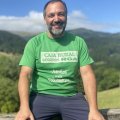
Aitor Onaindia Bereziartua
Basoa Fundazioa
Descended from a Basque family of baserritarras (farmers), he has been involved in the practice of agricultural, livestock and forestry management since he was a child. After several years studying and working as a forestry engineer in universities and organisations abroad (France and Chile), he has spent the last few years immersed in the development of sustainable forest management in the Basque Country. Since joining Basoa Fundazioa, now in his role as technical director, he has been disseminating both science and forest management and promoting and boosting the development of various projects aimed at innovating the Basque forestry sector and promoting and compensating for the multiple ecosystem services that forests offer society.
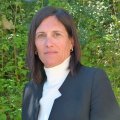
Leire Salaberria Isasi
Unión de Selvicultores del Sur de Europa (USSE)
Aunque de formación sea abogada mercantilista internacional, pertenece a una familia de tradición forestal, y desde el 2014, es la Directora-Gerente de la Unión de Selvicultores del Sur de Europa (USSE), organización internacional de propietarios forestales privados cuya actividad primordial es la de contribuir a la definición de la política forestal europea e internacional, mediante la toma de posición, representación y diálogo intersectorial, en foros internacionales relevantes aportando la perspectiva y demandas de los bosques del sur de Europa en los foros de decisión, —Unión Europea, FOREST EUROPE, Naciones Unidas, COFO-FAO— así como a través del dialogo y la cooperación con otras organizaciones del sector.
Speakers
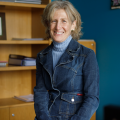
Rosa María Canals
Forestry Engineer and Doctor in Agricultural Engineering, full professor at the Public University of Navarra and member of the Spanish scientific council of the UNESCO Man and Biosphere programme. She holds three six-year research fellowships and belongs to the Ecology and Environment research group and the IsFood research institute. In her professional career she has led several projects funded by national and international bodies related to the ecology and management of natural resources in mountain areas in the face of global change scenarios. She has carried out research stays at the University of Innsbruck (Austria) and at the University of California (Berkeley, USA) and is currently leading a national bioeconomy project to implement regional development models based on the practice of pyrrhic herbivory to protect against large fires. She is co-founder of the Navarra Ecology Summer School, which celebrates its ninth edition in 2023.

Celso Coco Megía
Technical Forestry Engineer from the UPM and Master's Degree in Vocational Training, ESO and Bachillerato. He currently teaches Forestry and Natural Environment Management at the CIFP Almázcara of the Junta de Castilla y León. Member of Copernicus Academy since 2018. Associate Professor at the School of Agricultural and Forestry Engineering, University of León, Ponferrada Campus (during 2022). Interim civil servant in the corps of technical forestry engineers of the Junta de Castilla La Mancha and Extremadura period 2006-2012. Previously as an engineer in an engineering consultancy firm. Montero de Burgos Special Award XXII Edition, for the best dissemination work in the forestry sector. Manager of the @eforestal account on the social network Twitter with more than 28,000 followers, with great relevance in the forestry sector. Administrator of the "Forestry Education" space, with 1000 daily visits. Contributor to the magazine "Foresta" published by the Colegio Oficial de Ingenieros Técnicos Forestales. Since 2017, he has personally carried out evaluations of large forest fires, and several media have reported and published the results of these evaluations.
Forestry Engineer (2000 - UPV) and Master in Science and Integral Management of Forest Fires - MasterFUEGO (2019 - UdLLL), he studied Environmental Sciences (2002 - UPV), although he did not finish his degree (with 5 subjects to complete) because he started his professional activity in the Tragsa Group (2001-2005). Technician of helitransport brigade against forest fires (2002 - UPM). Since 2005 he has been director of Medi XXI GSA.. Specialised in Civil Protection and Emergency Management (2006 - UV). Associate Professor in the Dept. of Rural Engineering of the UPV and member of the Research Group in Forest Science and Technology (REFOR) of the Dept. of Hydraulic Engineering and Environment (2006 - 2013). Since 2015 Operations Instructor at the ENPC on operations in the Forest-Urban Interface and prescribed burning. Holder of the Forest Fire Defence System (SIDEINFO) patent recognised by the UN as "Best Practice" (International Catalogue - Code ESP134-12) for the application of prescribed irrigation for the creation of green firebreaks promoting effective self-protection actions.
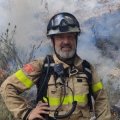
Asier Larrañaga Otxoa de Egileor
Born in Bilbao in 1970, a trained forestry engineer since 1995, he has worked in forestry planning and management both in the forestry services of the administration and in private companies. In 2002 he joined the Technical Unit of the Graf de Bombers de la Generalitat. Currently, as a sub-inspector of the Fire Brigade, he combines throughout the year his duties as a strategic fire analyst in Catalonia and as head of regional intervention for any type of emergency. He is in charge of the prescribed burning programme of the Department of the Interior of the Generalitat de Catalunya and is accredited as a trainer of the Institute of Public Safety of Catalonia. He has taken part in various exchange programmes between national and international fire-fighting operations, and has co-authored various research articles.
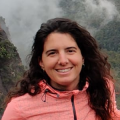
Alba Marquez Torres
BC3
She has a degree in Environmental Sciences specialising in GIS, Remote Sensing and Geomatics. Since 2011 she has collaborated with several Spanish national institutions and research groups such as CSIC (Spanish National Research Council), CTFC (Science and Forest Technology Center of Catalonia) or ERSAF (Evaluation and Restoration of Agricultural and Forest Systems) and in international institutions such as ELSA (Environment Life Cycle and Sustainability Assessment) in Montpellier and ANU (Australian National Universitiy) in Canberra. For 5 years he has worked in an R&D company, managing and developing modelling and mapping projects mainly related to the environmental field. He has also participated as a lecturer in several masters and specialisation courses on GIS, remote sensing and artificial intelligence. Currently, he is finishing his PhD in forest ecosystem services and fire with artificial intelligence at BC3.
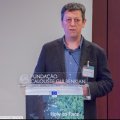
Paulo Alexandre Martins Fernandes
Paulo Fernandes is a Forestry Engineer and PhD in Forestry Sciences and professor at the University of Trás-os-Montes and Alto Douro, Portugal. His research focuses on fire ecology, behaviour and management. He has published numerous scientific papers and is co-author of the recent United Nations report 'Spreading like Wildfire: The Rising Threat of Extraordinary Landscape Fires'. He has served on the board of the International Association of Wildland Fire, on the supervisory board of the Pau Costa Foundation for Fire Ecology and Management, and on national parliamentary committees following catastrophic fires. Paulo has been invited to give keynote lectures and participate in advanced training and scientific evaluation activities in several European countries, Argentina, USA and Australia. He frequently collaborates with various stakeholders, including governmental agencies.

Cristina del Rocío Montiel Molina
Professor of Geography at the Complutense University of Madrid. She directs the research group " Geography, Policy and Socioeconomics of Forestry". She has specialised in pyrogeography, environmental history and land use planning. He has coordinated several European and national projects on social aspects of fires and fire history. She has developed an intense international activity as Visiting Professor at the Universities of Provence (France), California at Los Angeles (UCLA, USA), Universita'Degli Studi Di Napoli Federico II (Italy), Ottawa (Canada), and at the Australian universities of Melbourne and La Trobe. Throughout her university career she has received several scientific and academic awards, including the Ministry of Agriculture Publications Award, the distinction among the ten Excellent Professors of the Complutense University according to student quality surveys, and the Golden Batefuegos Award. In 2018 she was recognised in Fire magazine as one of the 145 world's leading women in fire science.
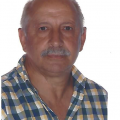
Juan Ramón Murua Mujika
UPV-EHU
Doctor en Ciencias Económicas y Empresariales por la UPV/EHU. Ha sido docente durante muchos años en la facultad de Economía y Empresa de esta misma universidad. Además, ha realizado estancias tanto en la Universidad de California como en el Centro de Estudios Vascos de la Universidad de Nevada. Su actividad investigadora se ha centrado principalmente en el ámbito de la Economía Regional y Local, Economía agraria y Forestal, Usos del Suelo y Demografía Espacial. En este sentido, ha participado en importantes publicaciones, congresos y comités ligados con el ámbito rural, el sector de la madera y la gestión de los bosques.

Aitor Onaindia Bereziartua
Basoa Fundazioa
Descended from a Basque family of baserritarras (farmers), he has been involved in the practice of agricultural, livestock and forestry management since he was a child. After several years studying and working as a forestry engineer in universities and organisations abroad (France and Chile), he has spent the last few years immersed in the development of sustainable forest management in the Basque Country. Since joining Basoa Fundazioa, now in his role as technical director, he has been disseminating both science and forest management and promoting and boosting the development of various projects aimed at innovating the Basque forestry sector and promoting and compensating for the multiple ecosystem services that forests offer society.

Víctor Resco de Dios
Víctor Resco is a scientist working on mitigating some of the main problems that threaten the sustainability of our society, such as climate change, forest fires and pollution. With a PhD from the University of Wyoming, he is a professor of forestry engineering at the University of Lérida and regularly publishes scientific columns in various media. He has written a book on forest fires, more than 120 articles in scientific journals and is currently one of the most cited scientists in the world in the fields of plant biology and ecology. He currently coordinates the Joint Research Unit between the Forestry Technology Centre of Catalonia and Agrotecnio (JRU CTFC-AGROTECNIO). For more information on his research, please consult his website: https://www.rescodedi.com/es/

Leire Salaberria Isasi
Unión de Selvicultores del Sur de Europa (USSE)
Aunque de formación sea abogada mercantilista internacional, pertenece a una familia de tradición forestal, y desde el 2014, es la Directora-Gerente de la Unión de Selvicultores del Sur de Europa (USSE), organización internacional de propietarios forestales privados cuya actividad primordial es la de contribuir a la definición de la política forestal europea e internacional, mediante la toma de posición, representación y diálogo intersectorial, en foros internacionales relevantes aportando la perspectiva y demandas de los bosques del sur de Europa en los foros de decisión, —Unión Europea, FOREST EUROPE, Naciones Unidas, COFO-FAO— así como a través del dialogo y la cooperación con otras organizaciones del sector.
Summary
Conclusions sent by the direction of the Summer Course
Sustainable development goals
Agenda 2030 is the new international development agenda approved in September 2015 by the United Nations. This agenda aims to be an instrument to favour sustainable human development all over the planet, and its main pillars are the eradication of poverty, a reduction in equality and vulnerability and fostering sustainability. It is a unique opportunity to transform the world up to 2030 and guarantee human rights for all.









